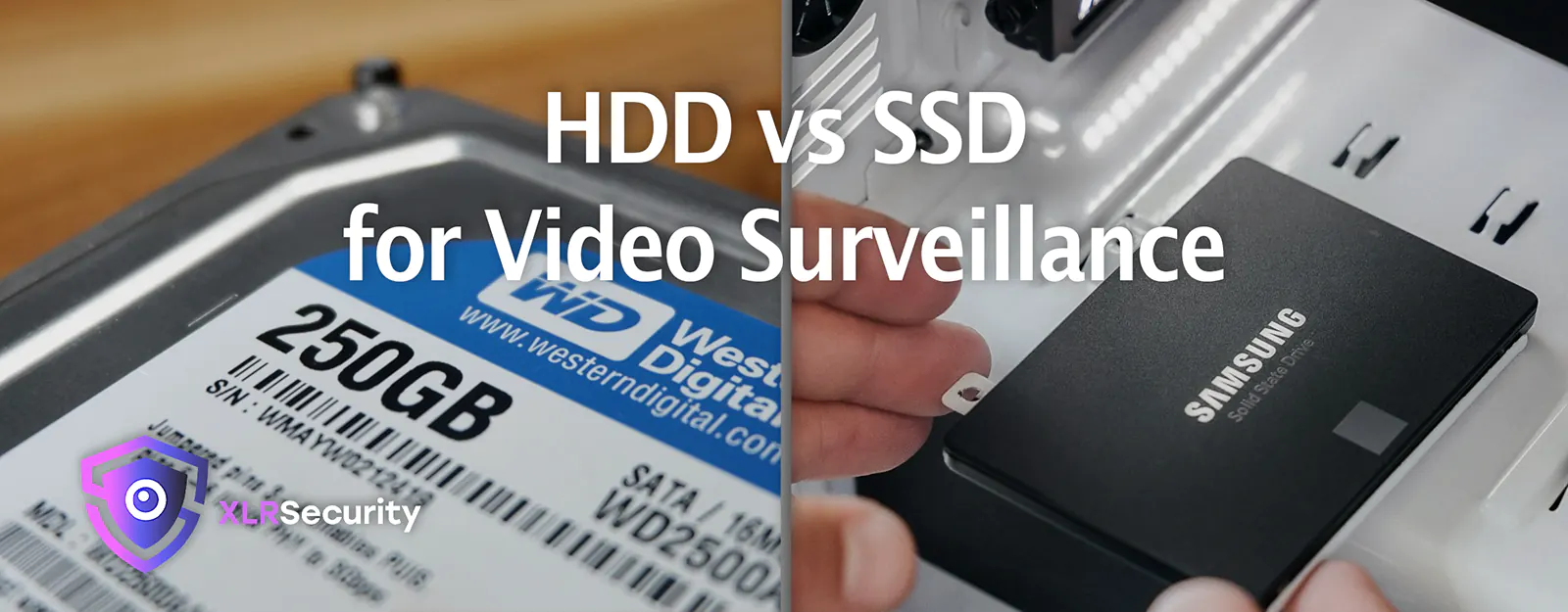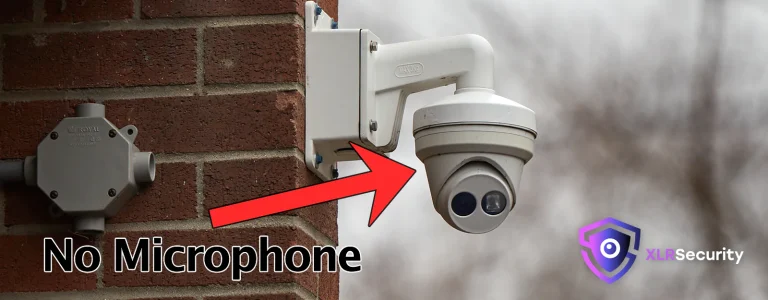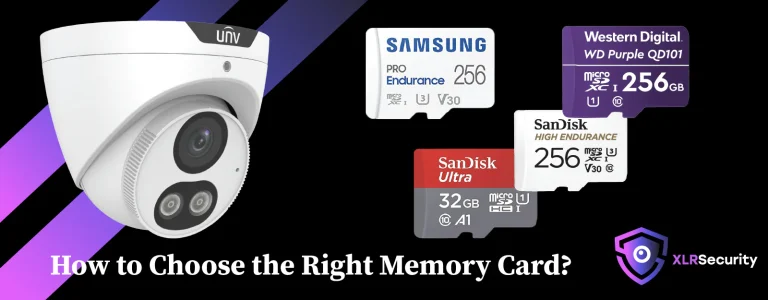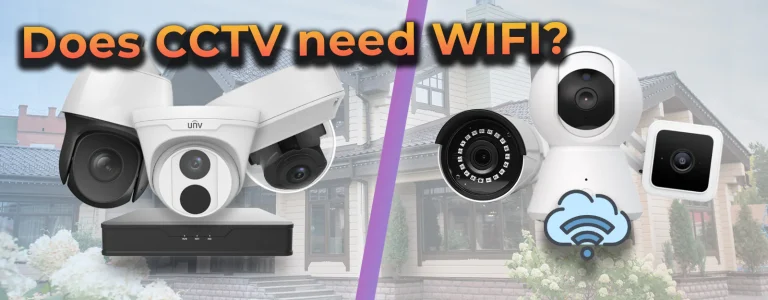An HDD and SSD both accomplish the same task (storing footage) but in different ways. A hard drive is a spinning metal disk, while a solid-state drive has no moving parts – all the data is stored in memory cells.
In this article, I’m going to cover the pros and cons of both HDDs and SSDs for video surveillance use. Then, I’ll offer my suggestion for which one you should use.
Is an SSD faster for Video Playback?
A well-known benefit of SSDs is that they can be much faster than traditional hard drives. The latest SSDs on the market use the PCIe 5.0 interface. They can hit blazing fast speeds of 12 GB/s or more.
In contrast, a Western Digital Purple HDD can reach speeds of up to 265 MB/s.
This seems like a huge win for SSDs, right? Well, not quite. The fastest SSDs require a PCIe 5.0 interface to reach their top speeds – and NVRs do not have it. Instead, they use a SATA III port for connecting to storage drives. The maximum bandwidth of a SATA III port is 600 MB/s, which is a lot slower than PCIe 5.0’s max bandwidth of 16,000 MB/s.
What this means is that if you take a fast SSD and install it inside your NVR, it will be limited to a top speed of 600 MB/s. This is slightly more than twice as fast as a hard drive, but not quite the step up as it would be inside a computer.
Also, the majority of the delay when initiating video playback on your camera system is related to your network speed. If you have a slow network, then playback will be slow no matter if you have an SSD or an HDD.
You will see a modest improvement when upgrading from an HDD to an SSD, but the SATA III bandwidth limitation means the differences will be lessened.
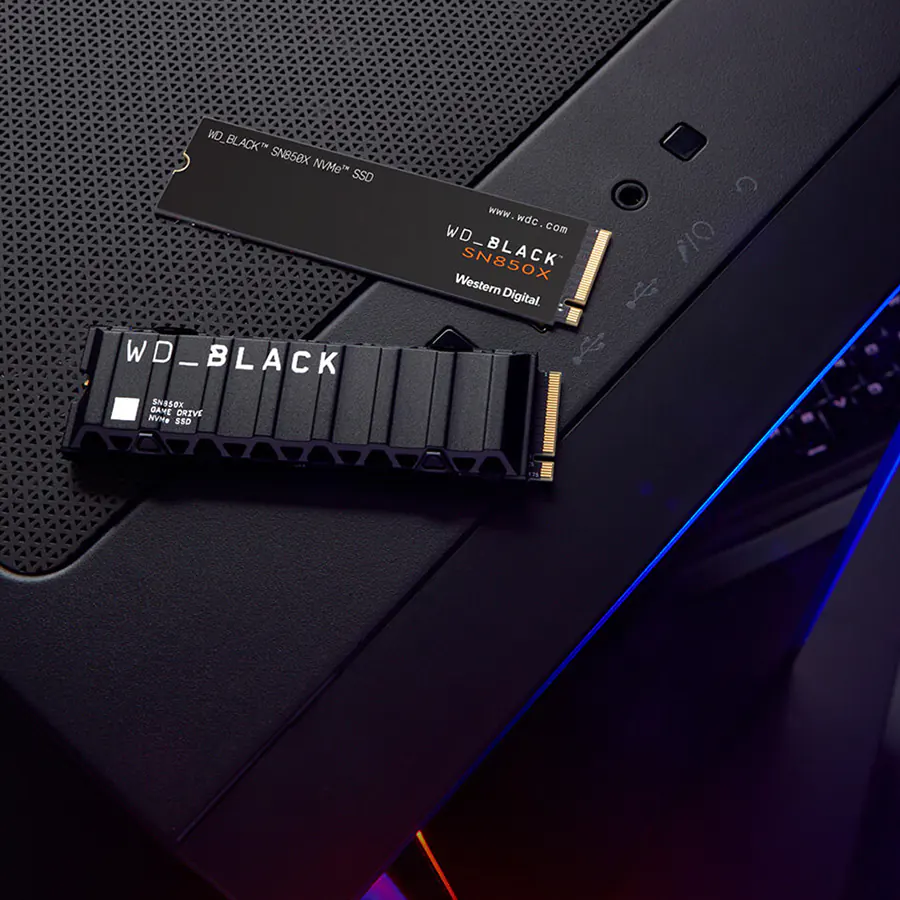
Longevity and Reliability
When it comes to reliability, hard drives tends to last for longer than SSDs. You can determine how long an SSD is designed to record for based on the TBW rating given by the manufacturer. For example: An SSD with a TBW rating of 700 should last for ~7 years while recording eight cameras.
If you have more or less cameras, the expected lifespan of your SSD drive will change accordingly. For example, if you had just two cameras then you could expect the SSD to last for around 28 years.
It’s difficult to compare the longevity of a hard drive directly to an SSD. This is because HDD manufacturers do not publish a TBW rating for their drives. Instead, the use what’s called an Annualized Workload Rating. This is defined as the amount of data written to or read from the drive.
Western Digital Purple HDDs have an annualized workload rating of 180 TB/year for the standard series, and 550 TB/year for the purple pro drives. As long as your stay within the annualized workload rating, the drive should remain reliable for many years. On our system with eight cameras recording continuously, we’re writing 96 TB of data to the drive each year. This puts us well under the 180 TB/year annualized workload rating – meaning the drive should last for a long time.
Personally, I’ve seen some Western Digital Purple HDDs in systems that are 7+ years old. I ran a S.M.A.R.T. Test to see if the drive had any issues, but it passed with flying colours. Therefore, I know that hard drives can keep working for many years without needing a replacement.
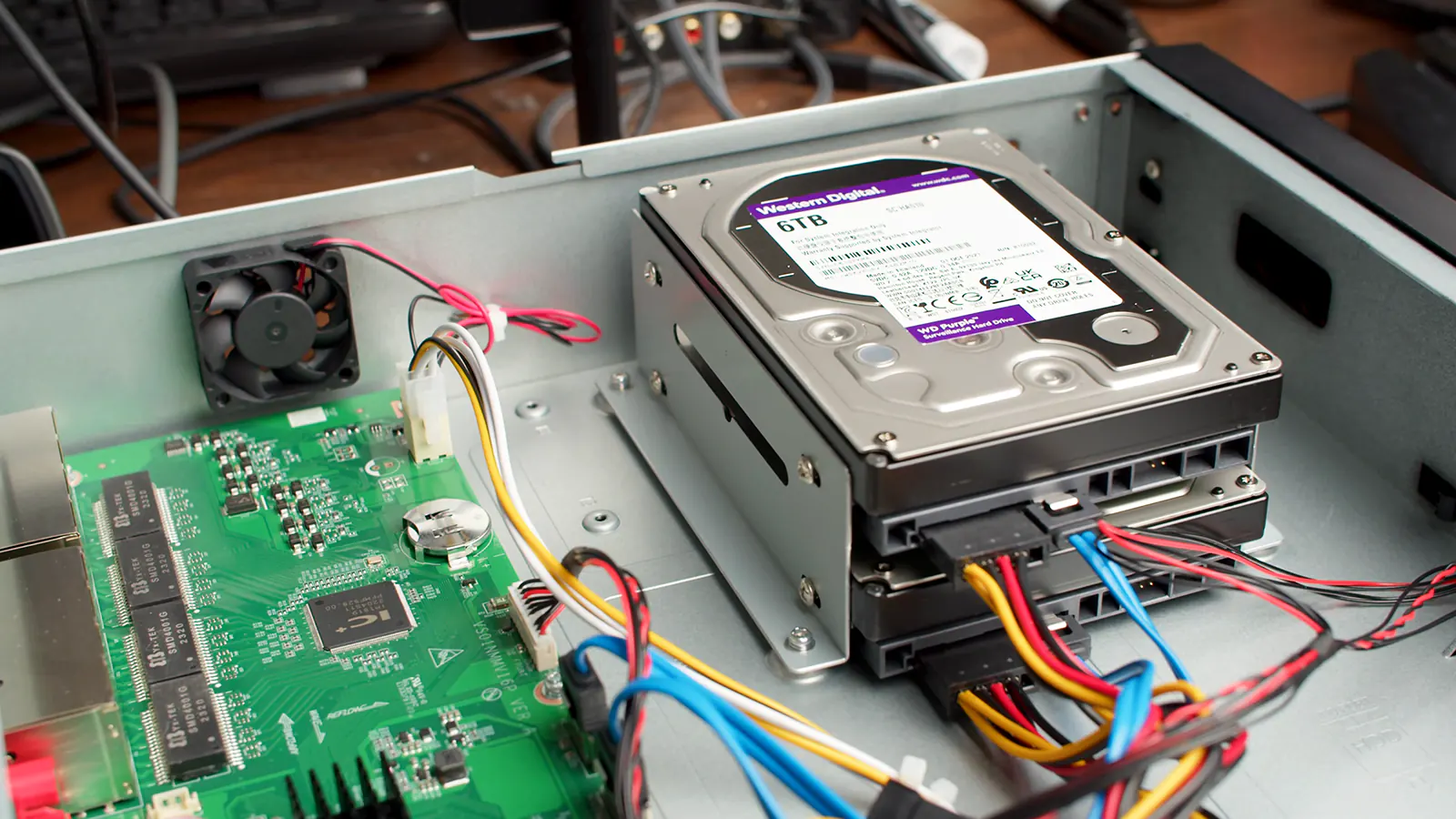
Noise & Power Consumption
All hard drives make noise while in use – this is because they have a rotating disk and mechanical read-and-write head inside. On the other hand, solid-state drives are completely silent. This silent operation can be a major benefit to purchasing an SSD for your video recorder.
Additionally, HDDs tend to consume more power than SSDs. We noted that a 4TB WD Purple Drive is rated for ~4.7 watts of power consumption, while a 4TB WD Blue SSD is rated for 3 watts. Depending on how much electricity costs in your area, you’ll use around $2-4 per year in additional electricity with a hard drive.
If you have multiple hard drives, this could quickly add up to extra costs per year. It’s definitely something to consider when choosing between a hard drive or an SSD.
Price Difference and Storage Capacities
Although the price of SSDs have come down a lot in the past five years, they are still more expensive compared to hard drives. For example, a 2TB WD Blue SSD costs ~$200 CAD, while a 2TB Western Digital Purple HDD is less than half that price – currently sitting at $95 CAD.
As you look at higher capacity drives, you’ll see this price gap increase. A decent 8TB SSD costs around $1,000 CAD while a similar 8TB HDD is less than $300 CAD. Therefore, you’ll be paying a premium if you want to replace your hard drive with a solid-state drive in a video recorder.
Also, it’s impossible to find SSDs with a capacity larger than 8TB (at least, I wasn’t able to). However, you can readily find 18TB, 20TB, and 22TB hard drives on Amazon. So, if you want to store your footage for many months, you’ll have no choice but to go with an HDD.
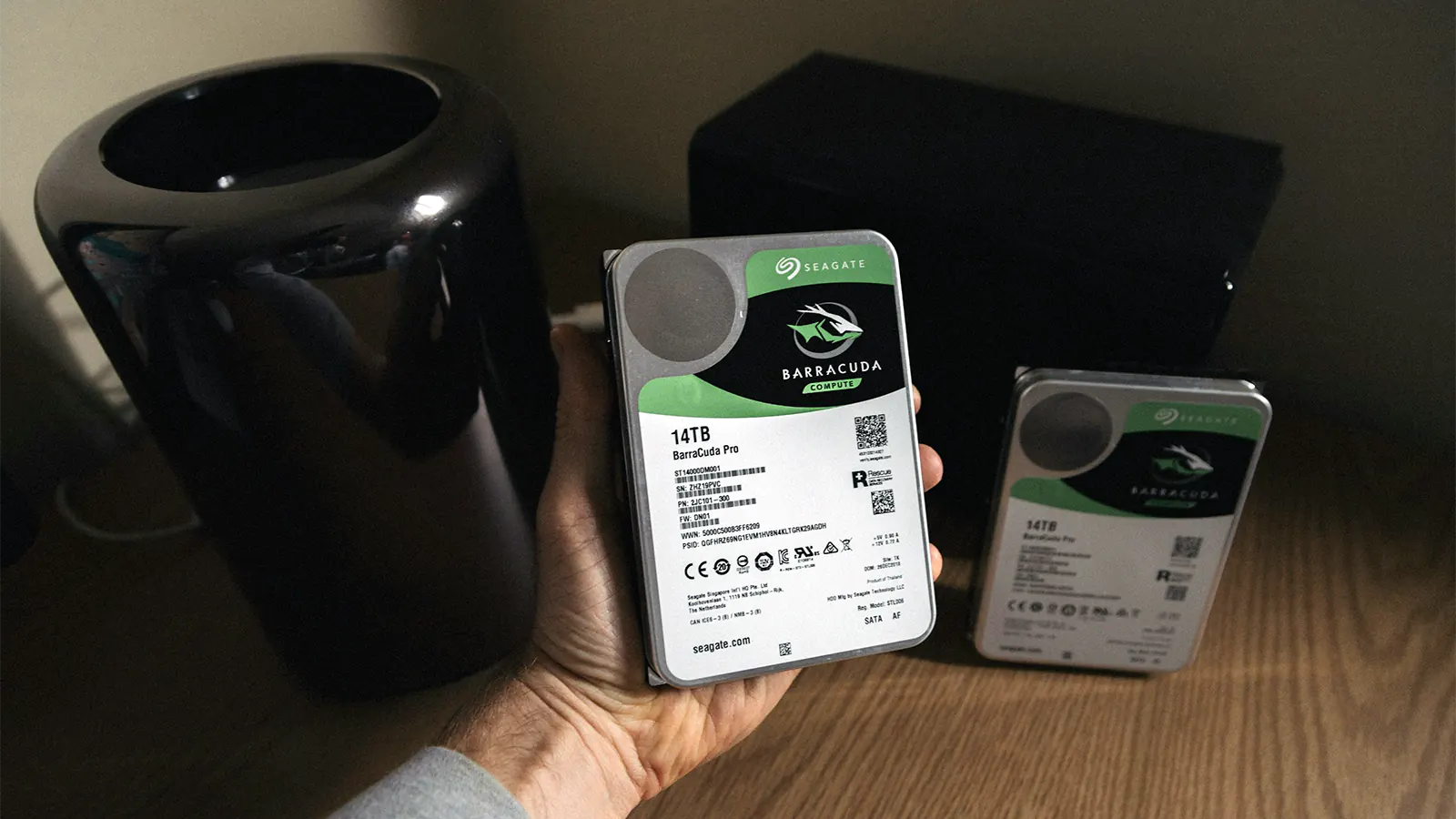
Final Thoughts
Should you upgrade to an SSD, or should you keep using hard drives? Well, ultimately it depends on your requirements and budget. If the low noise, faster speeds, and lowered power consumption are worth it to you, then an SSD makes sense.
However, for most users I would recommend sticking with hard drives since they are so cost-effective and are available in larger capacities. Until the price of SSDs drop further, they are too expensive for us to recommend for most users.

